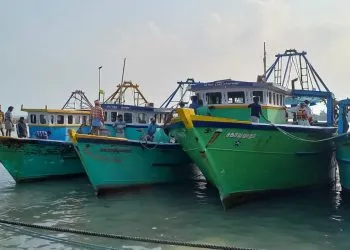Despite India’s objections, the Fisheries Department went ahead this week with the auctioning of some 150 Indian bottom trawlers seized for poaching in Sri Lankan waters and engaging in internationally banned fishing practices.
The department issued a public notice last month calling for bidders to dispose 105 trawlers detained in Karainagar, Kankesanthurai, Kiranchi, Talaimannar, and Kalpitiya. Another 45 trawlers were also included in the auction after legal proceedings were concluded by respective courts.
At Karainagar in Jaffna alone, the department raised Rs. 5.2 million from the sale of 133 trawlers on Monday. Fishermen and scrape metal traders were among those who took part in the auction.
According to the auction directives issued by the department, a participant was required to pay Rs 1,000 to enter the auction premises and be allowed to inspect the vessels at various locations in the North and at the Kalpitiya naval base.
The buyers were required to pay twenty percent of the total amount at the conclusion of the auction and the balance should be paid within five working days.
While the auction was underway, the Indian High Commission in Colombo issued a statement on Wednesday saying a team from the Indian State of Tamil Nadu was to visit Sri Lanka to work out modalities to finalise the disposal of unsalvageable Indian fishing boats in Sri Lanka.
“At the outset, it is stressed that there is an existing bilateral understanding between the Government of India and the Government of Sri Lanka on the matter,” the statement said while pointing out that the High Commission had again sought necessary clearance from the government for the visit.
Fisheries Director General S.J. Kahawatta told the Sunday Times the Indian trawlers auctioned this week had been cleared by the respective courts.
“Most of these trawlers were partially or completely damaged and not in usable condition due to the longtime anchorage in fisheries jetties in the North. Some of them had remained submerged,” he said.
At Friday’s auction at the Kalpitiya naval base, four seized Indian trawlers were auctioned at Rs 50,000 each. These trawlers, confiscated in 2019, were relatively in a better condition than the older trawlers detained in the north, the DG said.
More than a dozen bidders from Jaffna, Kurunegala and Wariyapola participated in the auction.
P.R. Patrick, a fisherman from Eluvaitheevu, one of the Northern islets, made the highest bid for an Indian trawler after a hot bidding process at Karainagar on Monday. He secured the vessel for Rs 1,350,000. He said he was hoping to convert the trawler into a multi-day fishing vessel to engage in deep-sea fishing.
In Mannar, eight trawlers were scheduled to be auctioned on Thursday at Thalaimannar but the auction drew hardly a bidder since most of the vessels were in bad condition as they had remained submerged in the sea.
Meanwhile, an adjournment motion that was to be tabled by the Tamil National Peoples’ Front (TNPF) in parliament to discuss the “Indian fishermen’s illegal trawling in Northern waters’, was withdrawn at last minute following assurances by an Indian High Commission official.
The party said the official assured them that the Indian government was looking into the issue with urgency considering the livelihood and welfare of the fisher communities of the two countries.
Taking part in Thursday’s parliament debate on the amendments to the Prevention of Terrorism Act (PTA), TNPF leader Gajendrakumar Ponnambalam said that while the Sri Lankan Government was turning a blind eye to the welfare of the Northern fisher community, neighbouring India had given an assurance to resolve the issue.
“The Government and the Navy should be held responsible for the current plight of our fishermen. We raised the issue of bottom trawling by Indian fishermen in the northern sea at various committees formed by the Fisheries Ministry and in Parliament but little or no action was taken,” Mr. Ponnambalam said. He also claimed that the northern fishermen were not only affected by bottom-trawling Indian fishermen, but also by Sri Lankan fishermen from other districts. They also carried out the same illegal fishing practices in the northern sea.
He noted that at least 200,000 people from some 50,000 northern families were directly or indirectly involved in fishing-related work and their livelihood took a hit in recent years due to the increasing number of Indian bottom trawlers that trespassed into the Lankan territorial sea, and could be seen even at some few hundred metres away from the coast.
The issue also came up during Tuesday’s talks between Foreign Minister G.L.Peiris and India’s External Affairs Minister Dr S. Jaishankar in New Delhi.
Both sides reiterated the longstanding consensus to handle fishermen issues through a humanitarian approach and refrain from the use of violence in dealing with incidents along the International Maritime Boundary Line, said a statement issued by India’s External Affairs Ministry. It also said the two ministers agreed that bilateral mechanisms should meet early, starting with the Joint Working Group on Fisheries.
A statement issued by Sri Lanka’s foreign Ministry described the issue as a ‘flashpoint’. It said Foreign Minister Peiris pointed out that “it has become a recurring issue, assuming a different complexion. The two sides agreed on the urgent need to convene all bilateral mechanisms in this regard.”
Meanwhile, Rameswaram fishermen staged a demonstration on Friday blocking the railway tracks to protest against the auction of their trawlers. They also demanded the immediate release of Indian fishermen from prisons.
Six of the 43 Rameswaram fishermen, arrested by the Navy in December last year, returned home on Thursday. Last week, 56 Indian fishermen were released from prisons after they were handed suspended sentences by Sri Lankan courts.
Rameswaram Fishermen Association leader R. Sesu Raja said both governments should work together to resolve the issue through talks without delay. “If they fail, we are prepared to return our fishing documents to the authorities at the sea,” he warned.


